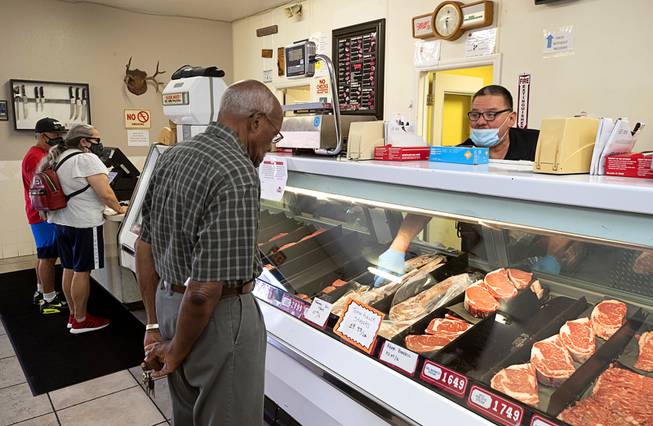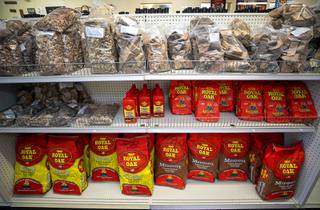
Mark Madril, customer service assistant manager, helps customer Al Philmon at Larry’s Great Western Meats, 420 S. Valley View Blvd., Thursday, May 21, 2020.
Tuesday, May 26, 2020 | 2 a.m.
At a Roberto’s Taco Shop in Henderson, the circles marked on the floor to separate customers aren’t the only signs of doing business in the coronavirus era.
There was an actual sign, too: “Due to the current shortage of meat, we are forced to temporarily increase our carne asada items by $1.50 each.”
That means an order of Roberto’s popular beef fries now costs $11.45 at the shop at 1530 W. Sunset Road.
“From our vendors, carne asada prices have doubled,” said Blanca Escoto, corporate operations manager for the chain, which has 56 locations in the Las Vegas area.
“Our suppliers are not only raising their prices, but they’re also struggling to keep us stocked,” Escoto said. “We had two choices — either stop selling carne asada or put a surcharge on it.”At restaurants, supermarkets and butcher shops, consumers in Las Vegas are seeing the price increases.
In April, U.S. consumers spent 4.3% more on meat, poultry, fish and eggs than they did the previous month, according to the Department of Labor’s monthly consumer price index.
The spike is partly due to shortages caused by shoppers panic buying during the crisis, but it’s also a supply chain problem, according to industry experts.
Some meat and poultry processing plants have been hit hard by the virus, with thousands of workers falling ill and some facilities forced to temporarily shut down.
“It’s all related to COVID-19,” said Mike Helmar, an agricultural economist at UNR’s Center for Economic Development.
“Everybody has read the stories about some of the meat processing plants being shut down,” he said. “Some of the plants that have been shut down for a time have been some very big ones, particularly with pork and beef, but also with poultry.”
With more people eating at home and restaurants closed, suppliers have also struggled to shift from providing commercial product to stocking grocery store shelves.
“It’s not impossible, but it’s difficult for the packers to change that up because meat that will go to a grocery store does not come off the same line,” Helmar said. “Those things are packaged much differently. It’s not like you can take meat from one line and put it on another line right away.”
At Larry’s Great Western Meats shop on South Valley View Boulevard, store manager Julian Khoury said some customers had complained about the higher prices while others seemed to understand the circumstances.
Some items also just aren’t available, Khoury said.
“Beef has skyrocketed with chicken close behind that,” Khoury said. “Nobody predicted the shortage to be this bad or the prices to go this high.”
Elie Khoury, Julian’s father, handles the wholesale side of Larry’s Great Western Meats, supplying restaurants and casinos around Las Vegas with steaks and other meat products.
He said the price increases had been jarring and unlike anything he had ever seen.
“A lot of companies are running out of beef,” Khoury said. “Pork has also gone up, and chicken has doubled in price in just the past few weeks. With our retail store, we’re barely making enough money to stay open because our margins have been cut so much. That’s after passing some increases to the customer.”
Some of the larger grocery retailers in the valley have placed limits on how many meat products a customer can buy at one time.
At Costco, the limit is three beef, pork and poultry items per member. At Smith’s, each customer can buy just two pork, chicken or beef products per visit.
“We feel good about our ability to maintain a broad assortment of meat and seafood for our customers because we purchase protein from a diverse network of suppliers,” a Smith’s spokeswoman said in a statement. “There is plenty of protein in the supply chain. However, some processors are experiences challenges.”
The good news is that the shortage is likely a temporary problem, Helmar said.
“We’ve seen, in the past couple of weeks, the shortage for beef and pork ease a little bit,” Helmar said. “As these plants come back online, prices will ease.”

